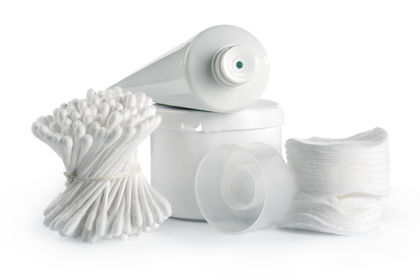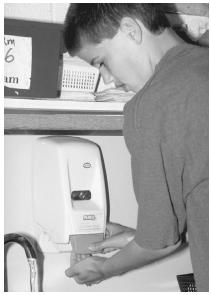Personal Care and Hygiene - Body basics

The best way to keep the body clean and free of infection is to wash on a daily basis. This means taking a shower or a bath and using soap and hot water to wash away the bacteria that build up over the course of the day. This also means washing one's hands several times a day. Since the hands touch many foreign objects as well as many familiar objects (like one's nose, mouth, and eyes), washing hands, especially after going to the bathroom, will prevent harmful bacteria from damaging one's health.
Washing Hands
One of the best ways to prevent bacteria from spreading and catching the common cold is to wash one's hands. While this procedure may sound simple, medical experts say that most people don't wash their hands properly or often enough.
Body Basics: Words to Know
- Abscess:
- When pus from a tooth infection spreads to the gums.
- Antibiotic:
- A chemical substance that can stop the spread of bacteria.
- Anus:
- An opening in the body through which solid waste is expelled.
- Bacteria:
- Tiny living things that have only one cell; some bacteria can cause disease.
- Bladder:
- An organ that holds urine.
- Bonding:
- Attaching a material to the surface of a tooth for cosmetic purposes.
- Circumcision:
- The removal of the foreskin from the glans of the penis.
- Cuticle:
- The skin surrounding the nail.
- Electrologist:
- A professional trained to perform electrolysis, or the removal of hair using electric currents.
- Enamel:
- The hard outer surface of the tooth.
- Epidemic:
- The rapid spreading of a disease to many people at the same time.
- Fluoride:
- A chemical compound that is added to toothpaste and drinking water to help prevent tooth decay.
- Fungus:
- A type of plant that has no flowers or leaves and isn't green in color (a mold is a kind of fungus).
- Genitalia:
- The reproductive organs.
- Gingivitis:
- An inflammation of the gums that is the first stage of gum disease.
- Gland:
- A part of the body that makes a fluid that is either used or excreted by the body; glands make sweat and bile.
- Halitosis:
- Chronic bad breath caused by poor oral hygiene, illness, or another condition.
- Hangnail:
- Loose skin near the base of the nail.
- Hormones:
- Chemicals produced by the body that regulate various bodily functions.
- Hypoallergenic:
- Unlikely to cause an allergic reaction.
- Infection:
- A disease that is caused by bacteria.
- Intestinal:
- Having to do with the intestine, the part of the body that digests food.
- Keratin:
- A tough protein produced by the body that forms the hair and nails.
- Menstruation:
- Monthly shedding of the lining of the uterus in females.
- Parasites:
- Any plant or animal that lives on or in another plant or animal and gets food from it.
- Periodontal disease:
- Gum disease, the first stage of which is gingivitis.
- Pinna:
- Outer part of the ear; part of the ear that is visible.
- Plaque:
- A sticky film of bacteria that grows around the teeth.
- Pores:
- Small openings in the skin.
- Protozoan:
- One-celled organism that can cause disease in humans.
- Puberty:
- The onset of sexual maturation in young adults.
- Sebum:
- An oily substance that lubricates the hair shaft.
- Sterilization:
- A process that makes something free of living bacteria.
- Toxin:
- A poison made by a germ.
- Urethra:
- The tube from the bladder to outside the body through which urine is expelled.
- Vaccine:
- A substance made up of weak bacteria and put into the body to help prevent disease.
- Vagina:
- The female canal that leads from the cervix (or opening of the uterus) to the vulva (or the external female genitalia).
- Veneer:
- A covering, often made of porcelain, that is placed over a tooth that is damaged or for cosmetic reasons.
The U.S. Centers for Disease Control and Prevention (CDC) recommends that people wash their hands:
- before and after eating
- after touching or playing with pets and other animals
- after sneezing, coughing, or blowing one's nose
- after going to the bathroom
- after touching trash or putting out the garbage
- before and after treating a cut or wound
In addition, the way people wash their hands is not always effective. For example, it's necessary to use soap and warm water, rub one's hands together vigorously, wash the front and back of the hands and the wrists, as well as under the fingernails, and then rinse. It's also recommended that the water be left running during the drying process so one can use a paper towel to turn off the faucet. In fact, a study done by Purdue University in 1997 reported that a group of children who followed a rigorous hand-washing plan greatly reduced their number of colds.
Controlling Body Odor
When a boy or girl begins to go through puberty, the body will produce more perspiration because sweat glands, some of which are located near the underarms, become more active. More perspiration means a different type of body odor, one that is stronger and similar to an adult's. Daily bathing and showering are enough to control body odor, but many people go above and beyond just washing and use different types of hygiene products that will keep the body smelling and feeling fresh.
DEODORANTS AND ANTIPERSPIRANTS. Deodorants and antiperspirants come in many varieties. Deodorants work to cover up the body odor, while antiperspirants work to control, or dry up, perspiration. Many products now contain both a deodorant and an antiperspirant. These products come as aerosol sprays, roll-ons, sticks, creams, and even crystals. Different people prefer to use different products, and the companies that make the products will advertise specific types of deodorants and antiperspirants for men and women. This is because men and women have different body chemistries. However, these products all tend to work the same way.
PERFUMES, COLOGNES, AND SCENTED SOAPS. Many people also use some kind of perfume or cologne or a type of scented soap. While these products were first created as a way to mask or cover up body odor, many people now use them as a way to express their individuality. Not everyone likes to use these types of products, however, and some people prefer a more natural smell.
There are many different types of scents on the market, and some are advertised toward a younger audience. While there's nothing wrong with using a perfume, cologne, or a scented soap, it's important to be careful about irritating sensitive skin. Young skin can be more tender than an adult's skin, so it may be wise to wait a few years before experimenting with these products.


Comment about this article, ask questions, or add new information about this topic: